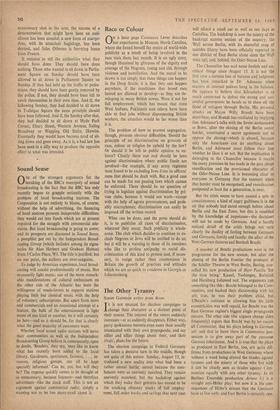The Other Tyranny
SARAH GAINHANI writes from Bonn IT is not unusual for election campaigns to change their character at a distinct point of their course. The interest of the voters suddenly increases—or as suddenly disappears. Either way, party spokesmen become even more than usually intoxicated with their own propaganda, and say sillier and sillier things about their, and their rivals', plans for the future.
The election campaign in Federal Germany has taken a decisive turn in the middle, though not quite of this nature. Sunday, August 13, in- troduced a new reality into what had been a rather unreal battle; unreal because the com- batants were so unevenly matched. They remain unevenly matched; but the backdrop against which they make their gestures has ceased to be the smoking chimney stacks of full employ- ment, full order books and savings that next year will afford a small car as well as ten days in Cattolica. The backdrop is now the misery of the bankrupt eastern section of the country; the Wall across Berlin, with its shameful crop of suicides (thirty have been officially reported in one district of East Berlin alone since the Wall went up); and, behind, the Oder-Neisse Line.
The Chancellor has said some foolish and un- ethical things since August 13. It is not the first time a curious loss of balance and judgment has been remarked in Dr Adenauer when matters at internal politics hang in the balance. He appears to believe that Khrushchev is as much concerned to defeat the strong and suc- cessful government he heads as to close off the flood of refugees through Berlin. His personal attacks on Mayor Willy Brandt have been scurrilous; and Brandt has retaliated by implying that Adenauer's talks with the Soviet ambassador at Bonn, after the closing of the Berlin sector border, constituted a secret agreement not to oppose the closing—which is absurd, because only the Americans can do anything about Berlin, and Adenauer must follow their line whether he likes it or not. But the implication is damaging to the Chancellor because it recalls the many promises he has made in the past about reunification and the provisional character of the Oder-Neisse Line. It is becoming clear to everyone in Germany that the moment when that border must be recognised, and reunification postponed at least for a generation, is near.
But the crisis seems to have caused a split in consciousness; a kind of angry guiltiness is in the air that nobody had cared enough before about Berlin and the East Zone; but this is modified by the knowledge of impotence—the decisions will not be made by Germans. And a hardly noticed detail of the crisis brings out very clearly the duality of feeling between Germans and Germans, family and family: the affair of the West German theatres and Bertholt Brecht.
A number of Brecht productions were in the programme for the new season; but after the closing of the Berlin frontier the producer at the Schiller Theatre in West Berlin, Barlog, can- celled his new production of Herr Punt ila `for the time being.' Kassel, Tuebingen, Bielefeld and Hamburg followed suit. The arguments'run something like this: Brecht belonged to the Com- munists, and backed their dictatorship with his art; true, he was their problem child, but Ulbricht's restraint in allowing him his little eccentricities was well repaid, for Brecht was the East German regime's biggest single propaganda success. The other side (the arguers change sides frequently) argues that Brecht was by no means all Communist; that his plays belong to German art; and that to leave them in Communist pos- session is to give away part of the common German inheritance. And it is true that the plays as produced in East Berlin, too, are quite dif- ferent from productions in West Germany where without a word being altered the tirades against tyranny and the misery of those who live with it can be clearly seen as tirades against Com- munism equally with any other tyranny. In its Berliner Ensemble production Arturo Ui is a straight anti-Hitler play; but now it is the con- sequences of Hitler's crimes that the Germans have to live with; and East Berlin is certainly one.


































 Previous page
Previous page